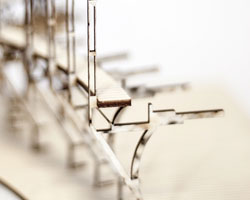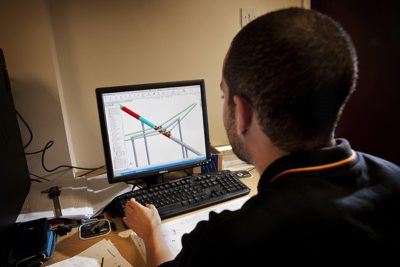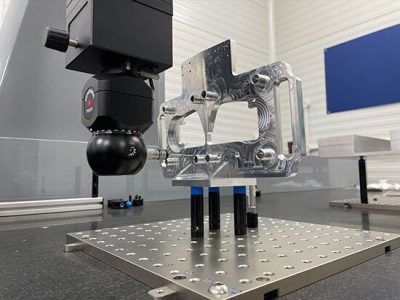
In an age of rapid innovation and miniaturisation, precision engineering has taken a significant turn towards micro-engineering. From medical implants smaller than a grain of rice to intricate components for satellites and electric vehicles, the demand for micro-engineered parts has never been higher.
At Thompson Precision, we’ve seen this shift first-hand. And we’re not just watching the trend. We’re actively engineering the future, one micron at a time.
What is Micro-Engineering?
Micro-engineering is a specialised branch of precision engineering that deals with the design  and manufacture of extremely small, high-tolerance components. These are often in the range of microns (one-thousandth of a millimetre).
and manufacture of extremely small, high-tolerance components. These are often in the range of microns (one-thousandth of a millimetre).
It combines traditional machining know-how with advanced techniques such as:
- Micro-milling and micro-turning
- Laser machining
- Electrical discharge machining (EDM)
- Additive manufacturing (micro-3D printing)
These technologies allow engineers to push the boundaries of what’s physically possible, delivering components with unprecedented accuracy, even at miniature scales.
Why the Shift to Smaller Components?
There are several reasons why micro-engineering is booming in 2025:
1. The Tech is Getting Smaller
From smartphones to wearable health devices, consumer technology continues to shrink. Every square millimetre matters, and manufacturers are under pressure to fit more functionality into less space.
Micro-engineered components are essential for building:
- Miniature sensors
- Compact motors
- High-density circuit boards
- Advanced optics
2. Growth in Medical Devices
The global market for implantable and wearable medical devices is projected to surpass £120 billion this year. Many of these innovations rely on micro-scale components, often ones that need to be biocompatible, durable and incredibly precise.
Think:
- Cochlear implants
- Insulin pumps
- Micro-needles for painless drug delivery
- Robotic surgical instruments
3. Aerospace and Defence Applications
 When it comes to performance in extreme environments, size and weight matter. The aerospace and defence sectors are turning to micro-engineered parts to reduce payload, improve efficiency and achieve finer control.
When it comes to performance in extreme environments, size and weight matter. The aerospace and defence sectors are turning to micro-engineered parts to reduce payload, improve efficiency and achieve finer control.
Whether it’s a component in a drone, a satellite or a next-gen missile guidance system, precision is critical. Micro-manufacturing delivers the necessary accuracy and consistency.
4. Electrification and Lightweighting
With the global shift toward electric vehicles and greener transport, every gram counts. Lightweight, micro-scale components help automotive manufacturers reduce energy consumption without compromising performance.
Micro-Engineering in Action: A Thompson Precision Perspective
At Thompson Precision, we’ve always specialised in high-tolerance, complex machining. Over the last two years, we’ve significantly expanded our capabilities to meet the growing demand for micro-scale work.
We’re not just making parts smaller. We’re making them smarter, lighter and more reliable.
Here’s what that looks like in practice:
✅ Sub-0.01mm Tolerances as Standard
Clients come to us with components that require tolerances tighter than 10 microns. We deliver them consistently, across batches. This isn’t luck or guesswork. It’s the result of decades of experience and ongoing investment in inspection, calibration and skilled operators.
✅ Advanced Machinery
We use cutting-edge CNC machines specifically designed for micro-precision work. These allow for multi-axis movement and extremely fine feed rates, giving us the ability to machine intricate geometries without compromising surface finish.
✅ Component Integrity
At small scales, even minor material inconsistencies can lead to failure. That’s why we apply stringent quality control at every stage, from raw material sourcing through to final inspection. We often use non-contact metrology and laser scanning to verify dimensions.
The Challenges of Going Small
Micro-engineering isn’t just traditional machining on a smaller scale. It brings its own unique set of challenges:
- Tooling becomes more delicate and more expensive
- Vibrations and thermal fluctuations have a bigger impact
- Component handling requires custom fixturing and often, microscopes
- Measurement and inspection demand ultra-precise metrology tools
This is why not every precision engineering company is equipped to handle micro-manufacturing. Choosing the right partner really does matter.
At Thompson Precision, we’ve spent years refining our approach, developing bespoke processes and training our team to operate at these extreme levels of accuracy.
Why Clients Choose Us for Micro-Engineering
Here’s why we’re trusted by clients in aerospace, defence, medtech and automotive for their most complex, high-stakes work:
- Experience with exotic and advanced materials such as Titanium, Inconel and PEEK
- Design-for-manufacture input. We work closely with engineers to optimise part design for micro-machining
- Flexibility. We’re equipped to handle one-offs, prototypes and full production runs
- UK-based with short lead times, ideal for reshoring and supply chain resilience in 2025
Looking Ahead: The Future is Micro
We believe the future of engineering isn’t just about making things faster or cheaper. It’s about pushing the limits of what can be achieved, especially when it comes to scale.
Micro-engineering enables innovations that would have been unthinkable a decade ago. From swallowable diagnostic robots to autonomous drones with fingertip-sized control units, the possibilities are expanding.
And we’re here for it. reflection of where engineering, technology and design are all heading. Micro-engineering is enabling smarter, lighter, more efficient solutions across almost every sector.
At Thompson Precision, we’re proud to be at the forefront of this movement. We’ve always believed that the real magic of engineering lies in the detail. And now, that detail is smaller, and more important, than ever.
If you’re working on a project that demands micro-precision, let’s talk. Whether you’ve got a concept, a CAD drawing or a part others have said is “too small to machine,” we’d love to help.
📞 Get in touch for a no-obligation chat about your requirement





